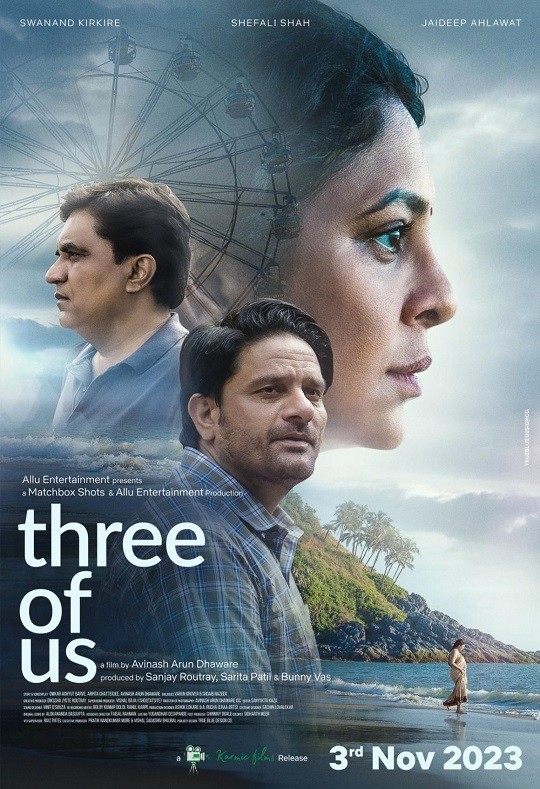Three of Us
Introduction
It is a Tuesday and with the MAMI Film Festival behind me, it is return to normalcy for me as well. I had one empty slot to cover either one of the theatrical releases that were out during the past weekend. And I decided to watch the Hindi film Three Of Us directed by Avinash Arun, which seemed like a meditative piece of love and loss. One of the main reasons why I wished to watch this film on the big screen was the cinematography(given that Avinash Arun was at the helm of it too) which promised to be absolutely breathtaking.
Earlier in the year, I had watched the English film Past Lives which was the most heartbreaking and relatable piece of art that was translated on celluloid. The emotion representing incompleteness and the ‘what-ifs’ was just so beautifully woven in a beautiful tale which lingered on long after the film had ended. Quite honestly, Three Of Us gave me a similar vibe of a story told through compassion laced with a feeling of incompleteness. With a stellar starcast at the helm of things, the film was always going to score, and score well. With much anticipation, I ventured into the film Three Of Us, does it manage to impress, let’s find out.
Story & Screenplay
Three Of Us is a beautifully woven tale of a woman suffering from Dementia who decides to take a trip down memory lane for probably the final time before her memories ebb away. The story here is a meditative piece of poetry told mainly through the stillness of the frames, and a sense of calmness while consistently hitting the right notes with respect to the heartfelt nature of the drama. There is a sense of love and loss represented as the past and present while uncertainly acts as the third dimension represented as the future. And this virtue of the drama is what allows it to linger on for a while after the film has long ended. The screenplay standing at just 98 minutes is taut, and the non-hurried nature of the writing has the ability to invest in the journey of the characters while witnessing the drama transform into a moving poetry of love, loss and some fading memories. This section will contain spoilers.
The drama opens with the introduction of the protagonist who is shown to tick some daily chores in her diary. That little scene gives a fair idea to the viewer on what to expect as the drama unfolds further. With every scene, you get to know the character of Shailaja better, one that she might be suffering from a neurological disorder(Dementia), and the other that she has quietly accepted her fate in the married space wherein there is a lot of respect and companionship with her very understandable husband, but love is fast fading out. Hence, her motivation to visit her childhood town in Konkan had a lot to do with latching on to her last strand of memories, knowing fully well that she was soon on the path of oblivion.
The proceedings are heartfelt and tonally represent calmness, much like the soothing memories of Shailaja which are being faded slowly but surely. On her visit to her childhood school, she stumbles upon a name ‘Pradeep’ which triggers a part of her childhood memory, thus wanting to meet her childhood sweetheart before time runs out. All along Dipankar, her husband is always supportive, having built his relationship with Shailaja on trust and companionship. The respect is mutual between the couple. Finally, when the three of them meet, you can almost see a sense of awkwardness across the room, more so for Pradeep who is transported back in his childhood when Shailaja and he were together while implying the fact that there were a lot of unsaid conversations between the two.
A banker by the day and a poet by night, it is evident that Pradeep has kept Shailaja alive in his heart through his beautiful poetry which is at times incomplete. In a moving scene, Pradeep is seen narrating a couplet much to the appreciation of people around him while being questioned by Dipankar on whether the poetry is incomplete(when he says ‘Bas Itna Hi?’). The incompleteness in his poetry is what represents his relationship with Shailaja. This while he is oblivious of the fact that Shailaja is suffering from Dementia and that he may soon be forgotten by her forever. Right throughout the narrative, the writers keep a tab on the deteriorating health of Shailaja with instances being of her quietly stepping out of an ongoing Bharatnatayam dance being performed at a school. Yet, certain memories which are intact does give her a little hope that things may not be as bad. The uncertainty of the future is real.
The quiet little trip of nostalgia is backed by certain episodes in the life of Shailaja. Her trip to a home which did hold a major place in her heart was slightly different from what she had imagined. A guava tree in the backyard being cut was symbolic of her memories which were slowly fading away. There is a sense of stillness in the drama that engulfs you at various junctures in the screenplay as you are transported in the world of calmness, free from the hustle and bustle of the city of Mumbai where the drama had first started from. The relationship between Shailaja and Dipankar is subtly strained wherein Shailaja reminds her husband, ‘Tum Woh Nahi Rahe, Par Isme Koi Achambe Ki Baat Nahi, Aise Hi Hota Hai, Sabke Saath Aise Hi Hota Hai'(You aren’t the sane person but it isn’t odd given that things change for everyone after marriage). This was probably the only instance wherein you see Dipankar vulnerable, having supported his wife all throughout.
The final act has imagery at its absolute best. You see Shailaja and Pradeep sitting together in a Ferris Wheel, and this is soon after Pradeep gets to know about the illness of Shailaja. The incomplete childhood dream of unspoken love and a wish to sit on the Ferris Wheel was coming true for Pradeep, but at what cost? He knew that he would soon be forgotten and lost in oblivion, and hence this was his final chance to relive his childhood with Shailaja. Shailaja too is aware of the same, while having to leave her fate to destiny, this while bitterly apologizing to Pradeep about their last meeting in school. The Ferris Wheel was symbolic of the cycle of life that goes around while also being interpreted as a vicious cycle of memories – the good and the bad, and the highs and lows of life.
The final shot of Shailaja standing next to a well was haunting enough and filled with uncertainty, much like the mind of Shailaja. The well here was symbolic of uncertainty, unknown to Shailaja on how deep it would be with respect to her illness. This was a bittersweet melancholic shot wherein the drama had transformed into poetry while lingering in my head long after the film had ended. The screenplay here was achingly beautiful and filled with metaphors of live while taking a quiet little trip down memory lane filled with nostalgia.
Dialogues, Music & Direction
The dialogues are sparingly used, allowing the frames to imbibe the emotions in play, something that created an ambience of a ligering impact. Not a single line was uttered on high octave, and the calmness of the drama was so crucial in drawing you in. The music is beautiful, capturing the vibe of the drama perfectly while adding a layer of representation of the Konkan area as well. The BGM mostly relies on deafening silences as also on the natural sounds that creates a meditative atmosphere symbolic of calmness. The cinematography is simply beautiful with each frame acting as a metaphor for love, life and loss. The wide angle shots act as postcards in what was simply the best frames that I have witnessed on celluloid in a very long time.
The editing is sharp and crisp while not compromising on the pace of the drama which was consistent throughout. The costumes represent simplicity with regard to the characters while pastel shades and subdued colours being used. Director Avinash Arun is perhaps the most underrated director doing the rounds. I have been a huge fan of his work be it Killa, Paatal Lok or even the series which was out this year, School Of Lies. There is a sense of craft with the kind of frames that he presents which in turn say a thousand words. And he is able to tactfully create several unsaid moments which weave magic onscreen. The direction is absolutely brilliant here.
Performances
The performances are absolutely beautiful by a set of very talented artists. Payal Jadhav as Majiri performed Bharatnatayam with such grace, and her expressions were to die for. Kadambari Kadam as Sarika is wonderfully restrained and just so supportive of her onscreen husband that made her character endearing and sincere.
Swanand Kirkire as Dipankar delivers a quietly heartfelt performance wherein he subtly showcases his vulnerability with utmost poise and grace. There was so much to like and learn from his character in what was a brilliant act was acceptance and love.
Jaideep Ahlawat is a phenomenal actor but here as Pradeep, I got to witness a softer side to him. His character was a man of few words, often resorting to writing couplets(beautifully penned by Varun Grover) while keeping feelings to himself. Yet, a sense of incompleteness that engulfs his character was so beautifully portrayed that his character stayed with me long after the film had ended. The sensitivity which he brings to his character was honestly a very complex emotion that cannot merely be performed without feeling it internally. No wonder, he is one of the best and most versatile actors doing the rounds currently.
Shefali Shah as Shailaja had such a complex role with layers and layers to it. You really required a skilled actor to master the blank stares with a storm of emotions tightly held within her. She showcased a sense of incompleteness herself while constantly being in battle with uncertainty related to her future. This was also accepting her fate as it stood, and these conflicting emotions were beautifully translated in this acting masterclass! You just can’t have enough of this performance, you just can’t!
Conclusion
Three Of Us is an achingly lingering poetry in motion on love, loss and some fast fading memories that makes for a beautifully heartfelt watch filled with frames that speak a thousand words. This drama comes with my highest recommendation and make sure you watch this in a theatre near you till Tiger 3 arrives. I repeat, Do Not Miss This!




